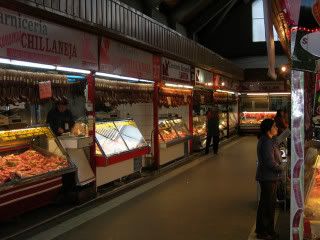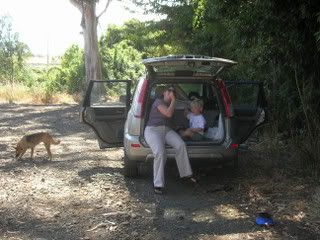It's over! No more vacation! Back to school(s)! Though I love hanging out with Hank I will admit, without shame, that there were some seriously long weeks tucked into January and February. Beyond that, though, the end of summer theoretically means we're moving closer to autumn and, finally, winter. Though we're still epochs away from setting boards to snow there was a certain ting to this morning's air. That plus the summertime snows are sticking around for more than a 24-hour period in the high country above the ski resorts. Yes, change is slowly and steadily afoot.
And could there have been a better way to end the summer than spending long lazy days in Chile's Lake District? I think not.
We left Santiago well before dawn. Our first stop was Chillán, about four hours away, for a longaniza breakfast sandwich. Our second stop was about an hour after that on a deserted country road so that the pooches could stretch a bit and we could brush our teeth.


Our rented cabana was not quite what we expected but it was cheap, had direct access to the lake, provided us with a (horribly uncomfortable) nights sleep, and afforded me the opportunity to take some fantastically depressing photos:




As was mentioned earlier, the Villarrica/Pucón area is big and beautiful with Lago Villarrica the centerpiece. The town of Villarrica sits on one end of the lake and, as it seems, houses pretty much all the people who service those who stay in Pucón or the surrounding area for the one or two weeks a year. Pucón, though pleasant enough, is hardly distinguishable apart from most any other high-end lake resort town in the western US. Well, other than the abundance of spoken German (punchline! hi-hat!).
We were never too far from a major water source. The lake is the obvious attraction as it's very big, very clear, and very clean. Not unlike Lake Tahoe. Most days ended there and provided nice relief from the late day heat.
We were never too far from a major water source. The lake is the obvious attraction as it's very big, very clear, and very clean. Not unlike Lake Tahoe. Most days ended there and provided nice relief from the late day heat.


What makes these things so impressive is the force at which they barrel out of the earth. And the constant volume of water. And the ten-meter deep or so pool beneath the falls. And then there is the temperature of the water: ice cold. And the crystalline blue purity of it.
The water then forms the Rio Caburga before it merges with the Rio Liucura, Palguin, Maichin, and the cloudy waters of the Trancura. This combined force eventually flushes into the Lago Villarrica, swishes around for about twenty miles before exiting as the green, slow, murky waters of the Río Toltén.
And it was the rivers that diverted my attention. And the prospect of all the silver things that live beneath their surfaces.
And they do. Though this isn't Chilean Patagonia, or Alaska, or much of the Western United States, there are plenty of respectable fish that live beneath the surfaces. Anyway, how could there not be? With rivers as clear and clean and rocky and perfect, it would be a damn shame.
The fish are small but sly. Apparently there is not much over twelve-inches. I don't know exactly the reason but it probably has something to do with over-fishing. That said, I fished entirely alone. I think I saw two other fisherman the whole week.
The waters are cold and they run swift all year long. Even wading up to my waist was difficult. I caught rainbows and browns and though not large their colors seemed to radiate from the chilly waters. In calmer conditions you could see them spring from the rocks below at depths of four or five feet. They were luminescent.



It was a great trip. For many reasons. Fish for one, but also the time to spend time in a place where time doesn't matter much. You eat; you fish; you swim; you stare at volcanoes; you listen to birds. You smell the pine pitch in the dry, hot air. You feel the cold, cold water on your feet slowly turn warm. You catch a fish, throw it back, and do it all over again. The slower the better.
More fishy songs. For keeps.
Hank Thompson: The Big One Got Away.mp3
Hot Club of Cowtown: It's My Lazy Day.mp3
Hank Thompson: The Big One Got Away.mp3
Hot Club of Cowtown: It's My Lazy Day.mp3






1 comment:
I love hearing about your adventures... thanks for sharing. I do have to rub in the fact that the snow in Heber/Park City, Utah is still hanging on - no signs of melting anytime soon. We still have a good 2 feet in the back yard and I am ready to take the snowblower to it. I'd like to get the garden in before June.
Love to you and yours - Sally
Post a Comment